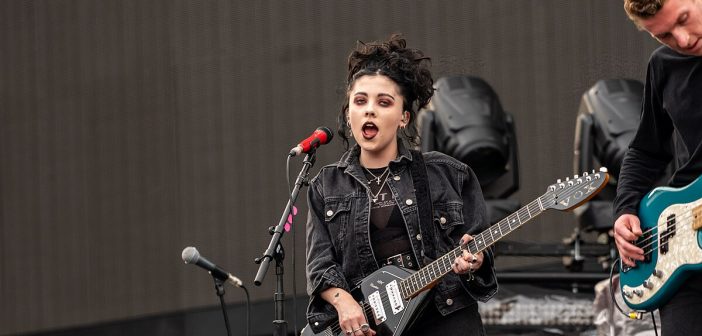Featured image: Photo by Raph_PH/ CC BY 2.0
Queer artists produce some of the most iconic, warm, and beautiful music! Let’s celebrate and recognise the voices that have been hidden for so long!
George Michael
When George Michael passed away on Christmas Day 2016, I was heartbroken. As a huge fan of 1980s music, both his collaboration with Andrew Ridgley, Wham!, and his solo releases had shaped a large part of my music tastes. Wham! were one of the most iconic groups of the decade, releasing mega hits such as ‘Wake Me Up Before You Go-Go’, ‘Last Christmas’ and ‘Club Tropicana’, becoming the first Western music act to visit China, and producing music videos filled with bright colours, tropical locations and infectious smiles.
Upon Wham!’s split in 1986, George Michael’s success only skyrocketed. Faith and Careless Whisper became worldwide number one singles, whilst he also recorded the duets ‘I Knew You Were Waiting for Me’ with soul legend Aretha Franklin and ‘Don’t Let the Sun Go Down on Me’ with Elton John. His 1987 single, ‘I Want Your Sex’ was banned on several radio stations due to controversy over its lyrical content. My personal favourite George Michael song, ‘Freedom ’90’, was released at a time when he became disillusioned with fame and the industry, notoriously refusing to appear in its famous music video, featuring supermodels such as Naomi Campbell and Cindy Crawford.
George Michael was outed in 1998, after being arrested for ‘engaging in a lewd act’ in a public toilet in California. Michael’s sexuality had been much-discussed and rumoured about for the entirety of his career, with his outing and criminal charge becoming worldwide news. The unjust and invasive reporting of his sexuality in the press as a result of this was devastating, but Michael did not allow it to derail his life or career, releasing a music video for his single, ‘Outside’, that mocked his arrest, and appearing on several television chat shows to talk frankly and honestly about it.
Upon his death, Michael was revealed to be incredibly philanthropic, donating millions of his personal fortune to several charities and individuals, including paying for a woman’s IVF treatment. Michael’s donations were only revealed after his death, his generous and giving nature kept private throughout his life.
Nearly seven years after his death, Michael’s music remains iconic. With hits ranging from Summer anthems to emotional, heartbreaking ballads, it is almost guaranteed that every person will love at least one George Michael or Wham! track.
Mollie Potter
Pale Waves
The career of Manchester band Pale Waves is very much split in two halves. Starting out as an 80’s inspired indie pop outfit, the four-piece have since transitioned into a rage of female pop-punk energy that Paramore, noted as one of their inspirations, championed to the mainstream in the mid 2000’s. While there is absolutely no denying that Pale Waves’ debut album ‘My Mind Makes Noises’ features some absolutely enormous bangers, they were always understandably overshadowed by labelmates The 1975. As a result, their switch in musical style really helped them to carve out a true identity with their music, therefore it is quite fitting that Who Am I? is the title of their second album in more ways than one.
With lead singer Heather Baron-Gracie coming out as gay since the release of ‘My Mind Makes Noises’, with Ciara Doran identifying as trans/non-binary, this theme of identity is also now key to their lyrical themes. Tomorrow is a powerful anthem that tackles the theme of discovering and experiencing day-to-day life as an LGBT person, with the repeated lyrics of “Won’t you stay alive/Give it one more try?” serving as a potent message that speaks directly to the band’s significant young, queer fanbase. Pale Waves are also certainly not afraid to feature queer themes in songs that cover matters that relate to anyone. ‘She’s My Religion’ is a classic example of a love song that can fit into anyone’s romantic playlist, it just focuses on two women rather than being pressured to succumb to traditional ideals.
The band’s third studio album, 2022’s ‘Unwanted’, instead delves into themes of harmful jealousy, depression, and suicide. Yet a sense of defiance is almost always present, and this is what sets Pale Waves apart from their contemporaries. They truly are pop-punk icons for the 2020s.
Callum Joynes
Freddie Mercury
When discussing our favourite queer artists, it would be a crime to forget the legend that is Freddie Mercury. His flamboyant tastes in both music and everyday life left an eternal impact that rocked the world, quite literally, then and now. The iconic Bohemian Rhapsody changed the sound of rock forever, and is probably the most recognisable, well-remembered, and beloved rock song in the UK and then some. In fact, it is the third biggest selling single of all time. This, combined with incredible hits such as ‘Another One Bites The Dust’ and ‘Killer Queen’ (some of my personal favourites) makes Queen the utterly entrancing band they are and were; still playing today, in memory of Freddie.
Of course, the powerhouse vocals featured in the originals of these songs makes Freddie Mercury a god of music in his own right. His heartbreaking performances of ‘Who Wants to Live Forever’, are an excellent example of his unbelievable vocal ability- sending shivers down my spine every-time I hear it, and not only from the vocals.
‘Who Wants To Live Forever’ was first performed in 1986, just five years before Freddie’s untimely death, the lyrics hitting incredibly close to home. Freddie Mercury was always defined by his flamboyant nature- fashion, personality art style, and lived his life plagued by questions of his sexuality. Yet, in the unforgiving sphere of attitudes towards homosexuality in the 80’s, Freddie Mercury thrived, relished, and settled into his personality, unafraid. He refused to change, refused to bow down in the face of adversity and threw everything into what he was passionate about; music. Freddie Mercury continued to tour, sing, perform, and be a public role model for any and all queer people long after his AIDS diagnosis in 1987. Mercury was not only talented, but brave, creative and unafraid of his identity until the very end.
This, amongst all of his earth-shattering vocals, songs, and albums is why Freddie Mercury is my favourite queer artist.
Emily Poole




